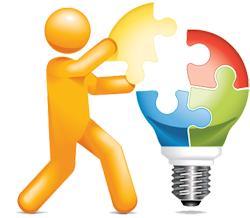Information Literacy Skills
a) Each person should have his or her own data. Record your primary experience with notes, records and measurements based on that experience. ![]() Keep journals, diaries, bench notes or memories.
Keep journals, diaries, bench notes or memories.
b) Collect secondary data from the Internet, the radio, books, television or in conversations and letters, and storing the most interesting documents of that in some logical way. Access to these records is desirable. Using Google fits in here, but what else have you got?
c) Make an effort occasionally to find the pattern that this recorded data offers. Try to understand it, to turn it back into information. Choosing what to "know" and integrating it with what you knew before, is a task that takes time and effort.
d) Do something with the new ideas you are generating. Talk about it, make plans, do something practical, or communicate what you are thinking, maybe by email. Doing something practical is a good test. If it breaks, go back to the beginning. Often when you learn things, full understanding of what you know comes weeks, months, even years later.
e) This may lead to action in some form. For instance, you might ![]() talk with your family about normal health, and ask them if your family should together do something. A then you can develop a programme of action, or
talk with your family about normal health, and ask them if your family should together do something. A then you can develop a programme of action, or ![]() a new lifestyle.
a new lifestyle.
Build Your Own Knowledge

Primary and Secondary Sources
You have for own PRIMARY experience. Do you also have your record of that? Your record! Ideally something more reliable than your memory.
![]() Keep a journal, diary or notebook. Maintain your own files on topics of interest. You know you can rely on that, and to the extent that it's not reliable, you have a feel for that too. You have your own data on many topics, and that informs you in a powerful way.
Keep a journal, diary or notebook. Maintain your own files on topics of interest. You know you can rely on that, and to the extent that it's not reliable, you have a feel for that too. You have your own data on many topics, and that informs you in a powerful way.
In addition like everyone else you have access to secondary records. What's in the press, on the Internet, or your mailbox?
You can store files, print, read, highlight, learn about, write notes on or discuss this secondary data and in the process, you may or may not accept the "information" it's supposed to contain.
Because of your primary experience, your own knowledge, reinforced by your journal if you have one, you have special tools for detecting propaganda if you care to use them.
Making a Beginning
It matters not a scrap where you begin. What interests you now?
A person who has information literacy skills will be connected with several communities of people who share an interest. Membership of these groups will provide new data for consideration and a continuing flow of challenging questions to ponder.
A Peer to Peer World
The peer-to-peer aspect of the internet has enormous potential and is seriously neglected by too many people. In general join groups, ![]() become active in groups, make yourself a full member. Direct person-to-person contact has a huge potential to introduce to you new ideas you would otherwise ignore. That can be transformative in your life.
become active in groups, make yourself a full member. Direct person-to-person contact has a huge potential to introduce to you new ideas you would otherwise ignore. That can be transformative in your life.
